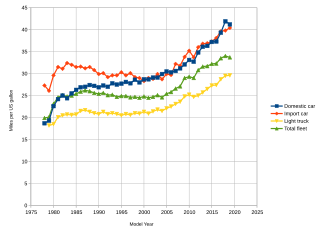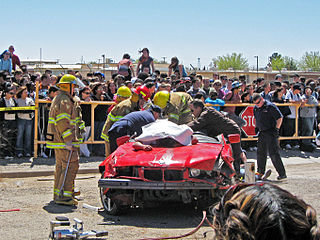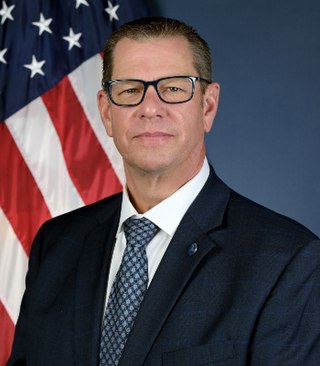Drunk driving is the act of operating a motor vehicle with the operator's ability to do so impaired as a result of alcohol consumption,or with a blood alcohol level in excess of the legal limit. For drivers 21 years or older,driving with a blood alcohol concentration (BAC) of 0.08% or higher is illegal. For drivers under 21 years old,the legal limit is lower,with state limits ranging from 0.00 to 0.02. Lower BAC limits apply when operating boats,airplanes,or commercial vehicles. Among other names,the criminal offense of drunk driving may be called driving under the influence (DUI),driving while intoxicated or impaired (DWI),operating [a] vehicle under the influence of alcohol (OVI),or operating while impaired (OWI).

Corporate average fuel economy (CAFE) standards are regulations in the United States,first enacted by the United States Congress in 1975,after the 1973–74 Arab Oil Embargo,to improve the average fuel economy of cars and light trucks produced for sale in the United States. More recently,efficiency standards were developed and implemented for heavy-duty pickup trucks and commercial medium-duty and heavy-duty vehicles.

Driving under the influence (DUI) is the offense of driving,operating,or being in control of a vehicle while impaired by alcohol or drugs,to a level that renders the driver incapable of operating a motor vehicle safely. Multiple other terms are used for the offense in various jurisdictions.
The National Highway Traffic Safety Administration is an agency of the U.S. federal government,part of the Department of Transportation,focused on transportation safety in the United States.

The National Traffic and Motor Vehicle Safety Act was enacted in the United States in 1966 to empower the federal government to set and administer new safety standards for motor vehicles and road traffic safety. The Act was the first mandatory federal safety standards for motor vehicles. The Act created the National Highway Safety Bureau. The Act was one of a number of initiatives by the government in response to increasing number of cars and associated fatalities and injuries on the road following a period when the number of people killed on the road had increased 6-fold and the number of vehicles was up 11-fold since 1925. The reduction of the rate of death attributable to motor-vehicle crashes in the United States represents the successful public health response to a great technologic advance of the 20th century—the motorization of the United States.
A Drug Recognition Expert (DRE) is a law enforcement officer trained in a scientifically validated method to identify people whose driving is impaired by drugs other than,or in addition to,alcohol. All DREs follow the same 12 step procedure called a Drug Influence Evaluation (DIE),to purportedly determine which category of drugs is causing the driver to be impaired.

This table shows the motor vehicle fatality rate in the United States by year from 1899 through 2021. It excludes indirect car-related fatalities.

Transportation safety in the United States encompasses safety of transportation in the United States,including automobile crashes,airplane crashes,rail crashes,and other mass transit incidents,although the most fatalities are generated by road incidents annually killing 32,479 people in 2011 to over 42,000 people in 2022. The number of deaths per passenger-mile on commercial airlines in the United States between 2000 and 2010 was about 0.2 deaths per 10 billion passenger-miles. For driving,the rate was 150 per 10 billion vehicle-miles:750 times higher per mile than for flying in a commercial airplane.
Sleep-deprived driving is the operation of a motor vehicle while being cognitively impaired by a lack of sleep. Sleep deprivation is a major cause of motor vehicle accidents,and it can impair the human brain as much as inebriation can. According to a 1998 survey,23% of adults have fallen asleep while driving. According to the United States Department of Transportation,twice as many male drivers than female drivers admit to have fallen asleep while driving twice.

Every 15 Minutes is a two-day program focusing on high school juniors and seniors,which challenges them to think about driving while drunk,personal safety,and the responsibility of making mature decisions. Along with alcohol-related crashes,it focuses on the impact that their decisions would have on family and friends.

Nicole Robilotto Nason is an American government official who served as the 26th Administrator of the Federal Highway Administration from 2019 to 2021. Nason previously served as the Assistant Secretary of State for Administration.

Alcohol-related traffic crashes are defined by the United States National Highway Traffic Safety Administration (NHTSA) as alcohol-related if either a driver or a non-motorist had a measurable or estimated BAC of 0.01 g/dl or above.

Deborah A.P. Hersman is a former board member of the U.S. National Transportation Safety Board who served as its 12th chairman. She completed two terms as chairman and was confirmed by the U.S. Senate on October 16,2013,for a third term. On March 11,2014,she announced she would join the National Safety Council as its president and CEO. She is currently the chief safety officer at Waymo.

Ann E. Carlson is an American attorney and legal scholar who has served as the acting administrator of the National Highway Traffic Safety Administration since September 2022. Before joining the Biden administration,Carlson was the Shirley Shapiro Professor of Environmental Law at the UCLA School of Law,where she also served as faculty co-director of the Emmett Center on Climate Change and the Environment. She is an expert on U.S. environmental law and policy with a particular focus on climate change and environmental federalism. Biden administration withdrew her from nomination in May 2023.

Field sobriety tests (FSTs),also referred to as standardized field sobriety tests (SFSTs),are a battery of tests used by police officers to determine if a person suspected of impaired driving is intoxicated with alcohol or other drugs. FSTs are primarily used in the United States,to meet "probable cause for arrest" requirements,necessary to sustain an alcohol-impaired driving conviction based on a chemical blood alcohol test.

Tesla Autopilot is an advanced driver-assistance system (ADAS) developed by Tesla that amounts to partial vehicle automation. Tesla provides "Base Autopilot" on all vehicles,which includes lane centering and traffic-aware cruise control. Owners may purchase an upgrade to "Enhanced Autopilot" (EA) which adds semi-autonomous navigation on limited access roadways,self-parking,and the ability to summon the car from a garage or parking spot. The company claims the features reduce accidents caused by driver negligence and fatigue from long-term driving. Collisions and deaths involving Tesla cars with Autopilot engaged have drawn the attention of the press and government agencies.

Two main questions arise in the law surrounding driving after having ingested cannabis:(1) whether cannabis actually impairs driving ability,and (2) whether the common practice of testing for THC is a reliable means to measure impairment. On the first question,studies are mixed. Several recent,extensive studies–including one conducted by the National Highway Traffic Safety Administration and one conducted by the American Automobile Association (AAA)–show that drivers with detectable THC in their blood are no more likely to cause car crashes than drivers with no amount of THC in their blood. Others show that cannabis can impair certain abilities important to safe driving –but no studies have been able to show that this increases the actual risk of crashing,or that drivers with THC in their blood cause a disproportionate number of crashes. On the second question,the studies that have been conducted so far have consistently found that THC blood levels and degree of impairment are not closely related. No known relationship between blood levels of THC and increased relative crash risk,or THC blood levels and level of driving impairment,has been shown by single-crash or classic-control studies. Thus,even though it is possible that cannabis impairs driving ability to some extent,there are currently no reliable means to test or measure whether a driver was actually impaired.

Jennifer L. Homendy is an American government official who is the chair of the National Transportation Safety Board in the Biden administration. Homendy has been the 44th member of the NTSB as of 2018. She has been chairwoman since August 13,2021.

Steven Scott Cliff is an American chemist and transportation official who last served as administrator of the National Highway Traffic Safety Administration. He also served as deputy executive officer of the California Air Resources Board and assistant director of sustainability in the California Department of Transportation.














